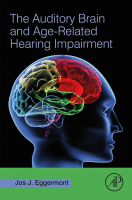Browse content
Table of contents
Actions for selected chapters
- Full text access
- Book chapterNo access
Appendix - A Primer on Auditory Evoked Potentials and Magnetic Fields
Pages 255-268 - Book chapterNo access
Index
Pages 269-279
About the book
Description
The Auditory Brain and Age-Related Hearing Impairment provides an overview of the interaction between age-related hearing impairments and cognitive brain function. This monograph elucidates the techniques used in the connectome and other brain-network studies based on electrophysiological methods. Discussions of the manifestations of age-related hearing impairment, the causes of degradation of sound processing, compensatory changes in the human brain, and rehabilitation and intervention are included. There is currently a surge in content on aging and hearing loss, the benefits of hearing aids and implants, and the correlation between hearing loss, cognitive decline and early onset of dementia.
Given the changing demographics, treatment of age-related hearing impairment need not just be bottom-up (i.e., by amplification and/or cochlear implantation), but also top-down by addressing the impact of the changing brain on communication. The role of age-related capacity for audio-visual integration and its role in assisting treatment have only recently been investigated, thus this area needs more attention.
The Auditory Brain and Age-Related Hearing Impairment provides an overview of the interaction between age-related hearing impairments and cognitive brain function. This monograph elucidates the techniques used in the connectome and other brain-network studies based on electrophysiological methods. Discussions of the manifestations of age-related hearing impairment, the causes of degradation of sound processing, compensatory changes in the human brain, and rehabilitation and intervention are included. There is currently a surge in content on aging and hearing loss, the benefits of hearing aids and implants, and the correlation between hearing loss, cognitive decline and early onset of dementia.
Given the changing demographics, treatment of age-related hearing impairment need not just be bottom-up (i.e., by amplification and/or cochlear implantation), but also top-down by addressing the impact of the changing brain on communication. The role of age-related capacity for audio-visual integration and its role in assisting treatment have only recently been investigated, thus this area needs more attention.
Key Features
- Relates the techniques used in the connectome and other brain-network studies to the human auditory-cortex and age-related hearing loss research findings
- Examines the side effects of age-related hearing impairment and their impact on the quality of life for the elderly
- Evaluates the importance of multi-modal means in the rehabilitation of the elderly with hearing aids and cochlear implants
- Discusses the role of neurostimulation and various training procedures to halt, or potentially reverse, cognitive decline in the elderly
- Relates the techniques used in the connectome and other brain-network studies to the human auditory-cortex and age-related hearing loss research findings
- Examines the side effects of age-related hearing impairment and their impact on the quality of life for the elderly
- Evaluates the importance of multi-modal means in the rehabilitation of the elderly with hearing aids and cochlear implants
- Discusses the role of neurostimulation and various training procedures to halt, or potentially reverse, cognitive decline in the elderly
Details
ISBN
978-0-12-815304-8
Language
English
Published
2019
Copyright
Copyright © 2019 Elsevier Inc. All rights reserved.
Imprint
Academic Press
